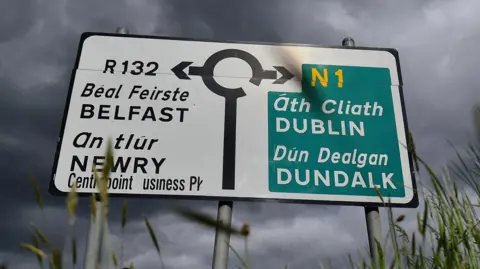The first year of a united Ireland could cost €3bn
 BBC
BBCThe first year of a united Ireland could cost €3bn (£2.6bn) according to a report which describes it as "well within what could be afforded".
The research, from Dublin City University and Ulster University, has calculated the cost of unity over the first 10 years.
It suggests the cost has been exaggerated partly because of how much the UK government subsidises Northern Ireland being "misinterpreted and misunderstood."
It also suggests that not enough attention has been given to any potential growth if Northern Ireland was back in the EU.
How is the cost worked out?
The subsidy from the UK government is the difference between how much tax is raised in Northern Ireland, and Northern Ireland's share of the overall UK budget.
This report estimates that number will be €1.7bn (£1.5bn).
This is after breaking down pensions, debt, defence, UK central costs, and taxation, and is much lower than other estimates of €11.5bn (£10bn) to €16.1bn (£14bn).
The report arrived at the €3bn (£2.6bn) first year total cost by taking that €1.7bn (£1.5bn) into account, plus an additional €1bn (£0.86bn) in public spending for "necessary investment", as well as the added costs of wage and pension convergence.
It recommends public spending in Northern Ireland should increase by €1bn (£0.86bn) a year to deal with necessary investment in health, welfare, education, and infrastructure.
It says this additional spending should be maintained, as a minimum, for 10 years.
 Reuters
ReutersThere would also be the added cost of equalising public sector wages.
Public sector wages in the Republic are on average 48% higher than those in Northern Ireland – impacting 29% of the entire NI labour force.
The report suggests it would cost an extra €152m (£131m) each year over 15 years.
In addition, it suggests the transfer of public sector and state pensions would cost an additional €115m (£99m) a year over 40 years.
It said: "This is well within what could be afforded, and allows scope for additional investment, as the economy grows, beyond the €1bn (£0.86bn) a year of additional spending built into this model."
Depending on economic growth, it suggests Northern Ireland would end its need for a subsidy in five to nine years.
Economic growth in the Republic averaged 3.2% a year from 2000 to 2024, whereas growth in Northern Ireland averaged just 1.3% over the same time.
Convergence with the south would therefore be likely to see a significant increase in economic growth.
 Ulster University
Ulster UniversityReport author Professor John Doyle, Vice President for Research in Dublin City University said:"With the same set of policies on education, infrastructure, tax and Foreign Direct Investment, there is no obvious reason why Northern Ireland would remain so much poorer and so much less economically productive that, for example Munster."
"Convergence with the more productive and wealthier Southern economy will take time, but the deficit will close much more quickly," he added.
Ulster University Economic Policy Centre's Dr Eoin Magennis said: "This paper sets out the ambitious level of growth needed to close gaps in public finances but also the time that will be needed to produce such a necessary convergence."
"How to do that – through improving educational outcomes in NI or adopting different infrastructural choices – will mean a fresh set of choices needing to be made," he added.
'Not convincing'
However Dr Esmond Birnie suggests Professor Doyle is minimising the assumed financial costs of a "United Ireland"
He said: "Prof Doyle, as in his 2021 ARINs article, rather optimistically assumes that the UK government would both meet all public sector pension obligations and release NI from its pro rata share of UK public debt."
He describes the report's funding requirements under different future growth scenarios as "not all that convincing."
"It would be desirable if NI moved on to a higher growth path but chronic under-performance in the NI economy suggests some of these things are not easily changed."
"Major constitutional change is neither a necessary or sufficient condition of improving economic performance and this report does not provide evidence that a United Ireland per se would spur performance," he added.
